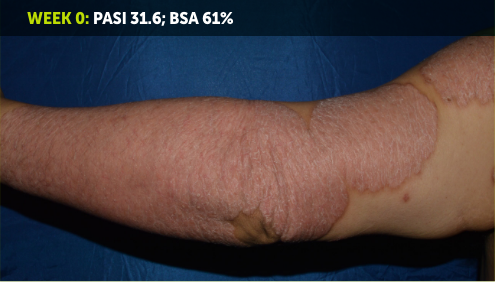
THE ONLY IL-17 INHIBITOR WITH DOSING EVERY 8 WEEKS1,7-9†
†The recommended dose of BIMZELX for adult patients with moderate-to-severe plaque psoriasis is 320 mg (given as 2 subcutaneous injections of 160 mg each) at Weeks 0, 4, 8, 12, and 16, then every 8 weeks thereafter. For patients weighing >120 kg (264.5 lbs), consider a dosage of 320 mg every 4 weeks after Week 16.
IL=interleukin.

CONSISTENT SAFETY PROFILE
THROUGH 3 YEARS6‡
‡Based on phase 2 and phase 3 studies. BE RADIANT was not included in this analysis, and adverse events in BE RADIANT were similar to those of the other clinical trials.
1ST & ONLY APPROVED
IL-17A + IL-17F INHIBITOR1-3
SEE HOW BIMZELX Targets Inflammation
The clinical relevance of the mechanism of action is unknown.
IL=interleukin.
RAPID, COMPLETE, AND MAINTAINED CLEARANCE FROM THE VERY FIRST DOSE1-5*
Take a closer look at the efficacy of BIMZELX, including head-to-head results against COSENTYX®, HUMIRA®, and STELARA®, as well as skin clearance data for bio-experienced patients.
*From the very first dose as measured at Week 4; results were not immediate.
Actual patient from the BE VIVID clinical trial. Please see the "Before & After" page for detailed dosing and results information.
BSA=body surface area; PASI=Psoriasis Area and Severity Index.
HELP CLEAR THE WAY WITH

Help make the treatment journey smooth from the start for your patients.
EXPLORE SUPPORT PROGRAMRAPID, COMPLETE, AND MAINTAINED CLEARANCE FROM THE VERY FIRST DOSE 1-5*
Take a closer look at the efficacy of BIMZELX, including head-to-head results against COSENTYX®, HUMIRA®, and STELARA®, as well as skin clearance data for bio-experienced patients.
*From the very first dose as measured at Week 4; results were not immediate.

THE ONLY IL-17 INHIBITOR WITH DOSING EVERY 8 WEEKS1,7-9‡
‡The recommended dose of BIMZELX for adult patients with moderate-to-severe plaque psoriasis is 320 mg (given as 2 subcutaneous injections of 160 mg each) at Weeks 0, 4, 8, 12, and 16, then every 8 weeks thereafter. For patients weighing >120 kg (264.5 lbs), a dose of 320 mg every 4 weeks after Week 16 may be considered.1
IL=interleukin.

CONSISTENT SAFETY PROFILE
THROUGH 3 YEARS6‡
‡Based on phase 2 and phase 3 studies. BE RADIANT was not included in this analysis, and adverse events in BE RADIANT were similar to those of the other clinical trials.
Actual patient from the BE VIVID clinical trial. Please see the "Before & After" page for detailed dosing and results information.
BSA=body surface area; PASI=Psoriasis Area and Severity Index.
1ST & ONLY APPROVED
IL-17A + IL-17F INHIBITOR1-3
TARGETS INFLAMMATION
The clinical relevance of the mechanism of action is unknown.
IL=interleukin.
HELP CLEAR THE WAY WITH

Help make the treatment journey smooth from the start for your patients.
EXPLORE SUPPORTPROGRAM
MORE EXPERTS. MORE INSIGHTS.



